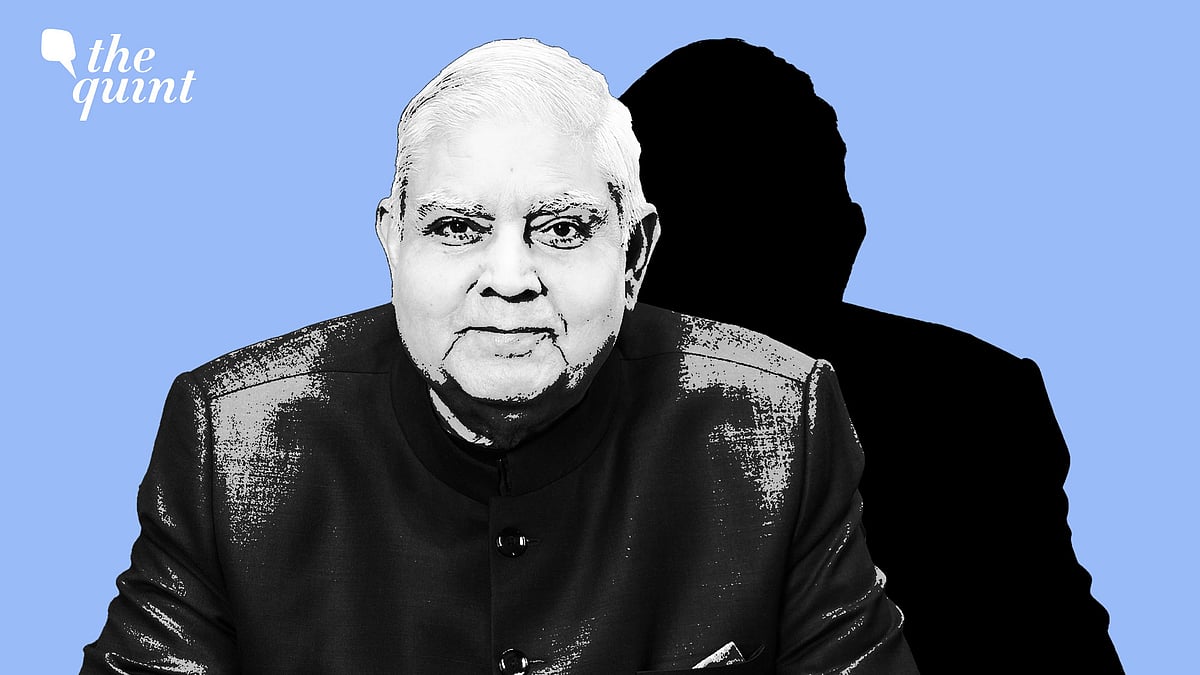
Dhankar's Exit Leaves a Chequered Legacy Behind, Signals Trouble for BJP Ahead
The irony is, Dhankhar seems to have been eased out by the very dispensation he often broke convention to please.

advertisement
Former Vice President Jagdeep Dhankhar will be remembered as much for the controversial manner of his exit from the second-highest post of the country as for his tumultuous three years as ex-officio chairperson of the Rajya Sabha.
His truncated five-year tenure was marred by frequent clashes with the Opposition in the Upper House of Parliament, and a penchant for setting off political storms by wading into issues beyond the domain of a constitutional authority.
From Political Foe to Political Ally
It is doubly ironic that after his resignation, the Opposition suddenly found merit in the former Vice President after three years of deriding him for being partisan and pushing the Modi government’s agenda.
Speculation has been swirling about the reasons for Dhankhar’s unexpected exit. However, the events that preceded the 9 pm announcement of resignation suggest that something was amiss even before the monsoon session began on 21 July. Indeed, the signs had been in the offing.
The first hint of tension between the VP and the Modi government came when union health minister JP Nadda, who is also BJP president and leader of the House in the Rajya Sabha, surprised everyone by seemingly assuming functions that are supposed to be the prerogative of the chairperson. Although Dhankhar was the sitting Chair, it was Nadda who instructed the RS staff to only record what he said, not the Opposition’s interruptions.
Unusual Concessions to the Opposition
In another telling indication of simmering discord, Dhankhar showed unusual generosity to the Opposition by allowing Congress president Mallikarjuna Kharge to speak at length on Operation Sindoor.
Later that afternoon, Nadda and Union Parliamentary Affairs minister Kiren Rijiju absented themselves, apparently without prior intimation, from a business advisory committee meeting. Dhankhar and Opposition leaders waited for over an hour, but there was no word from the ministers.
It was a crucial meeting as Dhankhar was expected to make an announcement on the sensitive issue of pending impeachment motions against two High Court judges—Justice Yashwant Verma (accused in a corruption scandal) and Justice Shekhar Yadav (accused of delivering a hate speech at a function in Uttar Pradesh).
A Late-Night Resignation That Shocked Delhi
Despite the obvious snub, Dhankhar did not seem fazed. He postponed the BAC meeting to the next day and, after an amiable cup of tea, everyone dispersed.
Consequently, the 9 pm announcement of resignation, supposedly on health grounds, was nothing short of a bombshell and sent shockwaves through the political class. Only two Vice Presidents have resigned before completing their term in the past 75 years—VV Giri and the other was RV Venkatraman. The difference is that both quit to contest and win a presidential election.
In a series of post-resignation interviews that got more and more candid as his frustration grew, Malik proved to be a huge embarrassment for the Modi government. He talked of corruption scams in J&K and blamed the 2019 Pulwama terror attack on intelligence failures, claiming he was instructed to stay silent.
Will Dhankhar Follow the Malik Playbook?
It remains to be seen whether Dhankhar will go the Malik way. There is some commonality between the two. Both are not from RSS or BJP stock and therefore, not entirely trusted within the Sangh parivar.
They were part of the JP anti-Emergency movement and then wound their way to the Janata Dal. They moved to the BJP only after 2014, when Narendra Modi swept to power to form the first saffron government at the Centre. At it happens, both also belong to the Jat community and see themselves as kisan leaders.
With US President Donald Trump regularly embarrassing the Modi government about forcing an India-Pakistan ceasefire after Operation Sindoor amid reports of mounting US pressure for a favourable trade deal, challenges on the domestic, security, and foreign policy front are mounting. Loquacious revelations from Dhankhar will only hurt the government further.
A Career Marked by Confrontation and Controversy
The question now is: how does Dhankhar want history to remember him?
He has a contentious record as Vice President. In three years, he repeatedly broke with convention to make political statements and speeches not expected of a constitutional authority. He had several run-ins with the judiciary which he accused of acting as a "super Parliament."
He strongly backed the BJP push for a National Judicial Appointments Commission Act, which the Supreme Court had nullified in 2015. He waded into the RSS-stoked controversy to delete the words "secular" and "socialist’’ from the preamble, saying the words violate the principles of sanatan. He shocked the political class by heaping praises on the RSS at a public function. This is just a short list, because Dhankhar seemed to court controversy rather regularly.
The biggest flashpoint occurred in 2013, when he suspended as many as 146 Opposition MPs of the RajyaSabha. No chairperson has ever ordered mass suspension on this scale.
Dhankhar leaves behind a chequered legacy. But more than the man, it is the institution he represented as Vice President that has taken a severe blow. His exit, seemingly at the behest of the ruling dispensation, has made a constitutional post almost an extension of the ruling party, giving a political hue it should not have.
(Arati R Jerath is a Delhi-based senior journalist. She tweets @AratiJ. This is an opinion piece, and the views expressed above are the author’s own. The Quint neither endorses nor is responsible for the same.)
- Access to all paywalled content on site
- Ad-free experience across The Quint
- Early previews of our Special Projects
Published: undefined